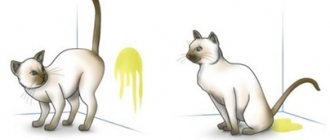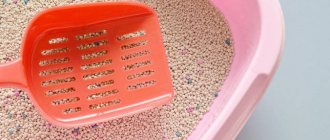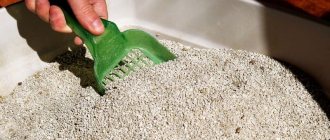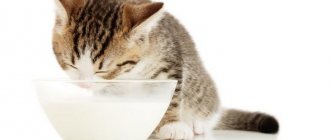Why “Toilet Matters” Appear in the Wrong Place
Dear readers, we looked at situations why a cat starts shitting anywhere. Let us repeat that the main root causes may be:
- diseases of the female genitourinary system;
- age-related changes after 10 years;
- intestinal upset due to poisoning or infection;
- post-stress syndrome;
- period of estrus;
- I don’t like the material and size of the pot;
- he only pees in one tray, but for “big things” he needs a second one;
- unpleasant aroma of the filler;
- poor location of the toilet seat;
- improper upbringing in childhood;
- desire to dominate the owner.
You can still list the reasons, because the characters, preferences and situations of pet cats vary, but the rules are general: a kitty should shit in the pot, and not in the corners.
Why does the cat pee anywhere?
If we are talking about a kitten, then most likely he is not yet accustomed to the tray. If an adult cat gets into the habit of shitting on the bed or carpet, you need to look for the reasons for such changes in behavior not only in the lack of education.
Reasons for going to the toilet in the wrong place may include:
- age-related changes;
- health problems;
- stressful situations;
- sexual instincts;
- complaints about the tray;
- dissatisfaction with the filler;
- lack of cleanliness in the tray;
- lack of attention from the owners;
- rejection of the place where the pot is installed;
- conflicts with other pets living in the house;
- radical change of environment (renovation, moving or purchasing new furniture).
On a note. If a cat starts peeing anywhere, there is no need to try to explain its behavior from the point of view of human logic. Sometimes this is the only way a pet can express his protest and show that something is bothering him.
How to stop a cat from peeing in the wrong place
To accustom a willful cat to the toilet, be patient and calmly persistent: eliminate as much as possible the factors that the fluffy beauty doesn’t like or that bother her.
But if you notice strange behavior and urinary incontinence in your kitty, then this could be feline urological syndrome (FUS). It's better to go to a veterinary clinic.
Experienced breeders and veterinarians advise using behavior correctors at the initial stage of potty training. There are different drugs. They are based on a smell that can attract an animal or, quite the opposite, scare it away. In this way, the pet develops the correct conditioned reflex to go and poop in the designated area.
Owners make scented mixtures themselves or buy ready-made ones at a pet store.
To educate or retrain?
It’s not hard to guess that in a timely manner solves many problems . There are a number of ways to train a cat to use the litter box and even the toilet; there is only one “but”: this must be done on time. The optimal time does not depend on the age of the pet, but on the length of time it has lived in your home. That is, it doesn’t really matter whether you adopted a kitten or an adult cat; you need to teach it “toilet etiquette” immediately after moving to a new home.
The first and main success factor is choosing a suitable tray . The size, depth and design itself are important. For training, it is better to use open, deep trays with sides and without a mesh. In some cases, cats ignore open litter boxes and then the only alternative is to buy a bio-toilet (a house with a roof and a litter box).
The second factor is filler . Speaking in a global sense, litter for cat litter boxes can be divided into: sand, sawdust and other means. Everything is clear with the first two, the third is granules with a certain moisture-absorbing chemical composition (most often silicone). In some lines there are fillers with flavorings.
Some owners prefer to accustom cats to sand (construction sand), paper, sawdust (not pressed) or soil the old fashioned way. There is some meaning in this, but we will talk about this below.
Important! If you are adopting a declawed adult cat, it will likely be painful for her to step on any litter! In this case, the pet is immediately accustomed to a tray with a mesh.
How to use folk remedies
Cat urine amber has a persistent aroma. It attracts the animal on a subconscious level. Therefore, the beloved again and again goes about “her business” to where the urine spirit is. If it is not possible to place a pot in this place, then this area must be treated so that the female is no longer attracted to the toilet there.
To do this, thoroughly wash the floors and marks with laundry soap and vinegar.
Apple cider vinegar is often used to treat tags because it has a more persistent odor. They also repel with the aromas of fir, garlic, iodine, alcohol, and potassium permanganate.
Cats also don’t like citrus amber. Therefore, you can place fresh orange and lemon peels in the corners, under the bed.
Important
: Do not use bleach! Because kitties love the chlorine smell; it serves more as a bait than as a repeller. Yes, chlorine removes the “fragrance” of urine, but its solution is used to treat the room only when the animal no longer lives there.
For older animals, when veterinary care is powerless and no means can save you, use diapers. This method will protect the apartment from unpleasant odors and give peace of mind to all family members.
If Kisulya has chosen a flowerpot for toilet purposes, then show resourcefulness: use toothpicks, plastic grates, i.e., arrange a “cute” barrier for the prankster.
What smells repel cats?
Cats are very sensitive to odors, so you can treat the damaged area with a certain product or solution so that in the future the pet does not relieve itself there.
Citrus
Cats cannot stand the smell of citrus
fruits. The aroma of citrus fruits is disgusting.
You can place orange or lemon peels in corners that are off-limits to your pet. For furniture, a polish with a citrus scent is suitable.
Vegetables
Cats don't like the smell of garlic and onions. To scare away the animal, you can grate these vegetables and place them in the right place, or fill them with water and wipe the surfaces with the prepared solution.
Perfumery
Pets are most sensitive to strong and persistent aromas. But here everything is individual. In addition, to scare away you need to use a large amount of perfume.
Essential oils
Some essential oils are disgusting to animals. Rosemary, lavender, mint, and citranella extract are great for these purposes. Oil is added to water and dripped onto the desired place so that the cat does not go there again.
Essential oils can be mixed with grated citrus peel or coffee grounds; such compositions will scare away your pet.
Some essential oils are disgusting to animals
Herbs
Cats are sensitive to some herbs.
To repel, you need to prepare a decoction: pour boiling water over the leaves of rosemary, cayenne pepper, and lavender and let it brew. Using a spray bottle, spray onto desired areas.
Pets do not tolerate and are afraid of the aroma of fresh dill.
Some spices repel cats: mustard, coriander, cinnamon, ground pepper, cumin.
Chemical substances
Cats have a negative attitude towards various chemicals: varnishes, shampoos, construction chemicals, detergents with a strong smell. You should use all this carefully so as not to irritate your cat’s nasal canals.
Vinegar
Vinegar occupies a leading position. A small drop of this product is enough to repel your pet.
Alcohol
Cats cannot tolerate the smell of alcohol and alcoholic products.
Cats cannot tolerate the smell of alcohol and alcoholic products.
You can wipe surfaces with alcohol, and a glass of alcohol left on the table overnight will discourage your pet from climbing on it.
If your cat begins to ignore the litter box and shits in different places, find out the reason and eliminate it, treat the favorite place with one of the listed products to remove unpleasant odors. For prevention purposes, use either natural repellents or special means for this purpose.
Popular purchased products
Experienced cat owners use ready-made scented lotions and sprays, and after treating odorous areas, they share their impressions on the Internet. Positive or negative reviews help other buyers decide on the choice of an industrial drug with targeted action.
Destroys the “fragrance” of urine
:
- SmellOff removes the scent of cat marks from any surface;
- "DezoSan" from Zoo Clean removes odors as much as possible, rather than masks them. The solution can be added to the container of the washing vacuum cleaner;
- OdorGone is a hypoallergenic drug, patented in the USA. The lotion can be used in rooms with children and allergy sufferers. Effectively fights old, ingrained aromas;
- Urine-off Cat & Kitten blocks ferromones using enzymes and biological agents. Easily decomposes urine into simple components: water and carbon dioxide. Harmless, hypoallergenic product made in America.
Repels from places not intended for the toilet
:
- biospray "Antigadin";
- spray lotion “Shit? No!"
- "Mr.Fresh." Unlearning to shit”;
- “Don’t shit! Don't tag!";
- "Beaphar Stop-it Cat";
- “Smart spray – protection of places”;
- Antipakostin "Happy Cat".
Attracts to the tray:
- "Smart spray";
- "Mr.Fresh." Accustoming to place";
- “Ms. Kiss. Spray for cats";
- Spray corrector "Doctor ZOO".
Cat repellent to stop them from pooping
There is a wide choice of means and methods to treat the area where cats have pooped:
- Wipe the floor, walls and corners with a weak solution of vinegar or potassium permanganate
- alcohol for processing ;
- hydrogen peroxide has disinfectant properties and is also suitable for short circuits;
- iodine solution - add up to 15 drops to water;
- if a pet shits on the beds or flowers, then the area can be sprinkled with ground pepper ;
- laundry soap eliminates odor, you need to wash the surface with the solution;
- mix baking soda
- add a bite to the water in a 1:1 ratio, wipe the surface and then cover it with soda and hydrogen peroxide, after the mixture has dried, remove it;
- place a few lemon slices ;
In addition to these methods, you can use special veterinary drugs.
In addition to folk remedies, you can use special sprays
Basically, they are available in the form of sprays. The most famous are from ]Antigadin[/anchor] and Emix spray.
The latter can be sprayed directly onto the cat tray and litter, as it eliminates all unpleasant odors from feces. Absolutely safe for animals and people.
There are special sprays for taming a cat to the litter box. You need to spray a small piece of paper with the product, then let your pet smell it and put it in the tray.
Popular disinfectants and taming agents:
- Hartz;
- Beafar is a large line of products in different forms: sprays, drops;
- A faithful friend - powder, detergent and spray;
- Zoovorsin - to remove odors from furniture and carpets;
- M. Kiss - spey, repeller and toilet tamer;
- Smart spray.
What to do if your cat goes on the bed
First, it is worth identifying the motives why the cat does such things. She may show jealousy towards another animal, mark or take revenge. Depending on the cause, measures to combat them will be selected.
- Pay more attention. Sometimes the animal begins to show attention to itself in this way, and the bed is one of the fastest and most effective ways.
- Mark the territory. Sterilization or castration of the animal can help with this problem.
- Use strong scents to repel the animal. For example, you can choose citrus or lavender.
- Close the bedroom door. Of course, this may start to make furry angry, but it is better to sleep in a clean bed.
Why Gestrenol is effective against marks in cats and kittens
The drug Gestrenol was specially developed for domestic cats, taking into account their species and gender characteristics. If used correctly, this tool can be indispensable for scaring animals away from inappropriate places. This is due to the fact that it contains two synthetic analogues of animal sex hormones, the smell of which is indistinguishable to humans, while it is clearly felt by animals. As a result of the drug, the animal begins to perceive the territory as marked, which confuses them.
Due to the content of two hormones at once, this product acts on both cats and female cats, while the amount of chemicals is kept to a minimum.
To suppress the desire of some animals to fight with an imaginary competitor, the composition includes a natural sedative such as catnip. In addition, this auxiliary component allows you to find an approach to even the most capricious animals.
Cat Urine Odor Eliminators
To prevent your cat from defecating again in the wrong place, it is necessary to completely eliminate the smell of the animal.
How to remove the smell of cat urine? You can use improvised and special tools.
Oxidizing agents will help eliminate the smell of pet feces:
- hydrogen peroxide;
- iodine solution – 10-20 drops per liter of liquid;
- water with lemon juice;
- concentrated soda solution;
- alcohol solution.
Getting rid of the smell
Professional products that help remove the smell of cat urine:
- DezoSan and Zoosan
- UrineOff
- Complete Pet Stain&Odor Remover
- Pet Stain&Odor Remover
- Bio-Vax toilet deodorants.
High-quality chemical products must contain enzymes. You can identify stained areas using an ultraviolet lamp. This way you can definitely stop your cat from shitting in the wrong place.
Fighting odor
Regardless of the reasons for the animal’s vicious behavior, the smell must be eliminated as efficiently as possible and in a short time.
Due to its specific composition, cat urine is poorly washed off (especially from surfaces that absorb moisture) and can “scent” the room for a long time. This effect is achieved by the urochrome, urea and uric acid it contains. The latter quickly crystallizes and retains its odor as soon as water hits the crystals again. For cleaning, you can use both factory-made household chemicals and folk remedies. There are often situations when both methods, their combinations and all the imagination of the homeowner are useful.
Household chemicals
Cleaning up a fresh puddle from hard, moisture-repellent surfaces is simple and ordinary cleaning products sold at a hardware store are often sufficient. If you have absolutely nothing at hand, dishwashing or floor washing liquid is suitable for “surgical intervention”.
The situation is much more complicated with old stains that have managed to be partially absorbed and crystallized, and with contamination of soft, highly absorbent surfaces - a sofa, bed, carpet, clothing. Here, chemicals are needed that decompose uric acid and its crystals. You can buy them at pet stores. Available in three formats: liquid, spray and dry powder. Of the variety of means to combat odor from “toilet tricks,” five of the most popular stand out.
- Zoo Clean "DezoSan". Odor neutralizer that can be used when cleaning with a washing vacuum cleaner. It also purifies the air in the room being treated. The manufacturer's line includes separate products for carpets and other pile coverings, a concentrate for sanitary treatment of premises, plumbing fixtures, and trays.
- Odorgone Animal Gold (“Odorgone”). Available in spray form. Can be used in rooms where allergy sufferers, asthmatics and families with small children live. Development - USA, production - Russia.
- Bio-GM. A natural product that eliminates odor and pathogenic microorganisms.
- Urine Off. Suitable for treating any surface, it destroys uric acid crystals and creates an imperceptible “protection” from re-contamination.
- Odor kill. A liquid concentrate against unpleasant odors as such, but also helps against the smell of cat urine. The product itself has a vanilla scent.
There are a lot of brands and detergents, cleaners and disinfectants on the market, and you will surely find something that suits your budget and needs. The only thing you should avoid is regular detergents with chlorine. Firstly, chlorine itself is not very useful and smells no better than cat urine. Secondly, many cats perceive its smell as an invitation to go to the restroom here.
Folk remedies
If you don’t have commercial chemicals on hand or for some reason they are unavailable, you can turn to methods invented by experienced cat owners. One of the most popular remedies is a weak solution of potassium permanganate, but there are others that are no less effective.
- Vinegar (table solution). Removes the smell of urine and soon evaporates. Does not leave stains or damage paint.
- Lemon juice. Decomposes the biological component of pollution and effectively removes fresh odors. The remaining aroma will prevent the cat from going to the toilet in this place again.
- Hydrogen peroxide. May damage the varnish surface of furniture and some fabric dyes.
- Iodine. Used mainly for washing and disinfecting floors. Ten drops of iodine are dissolved in 1 liter of water.
- Soda. Use separately as a cleaning agent (on matte surfaces) or mixed with hydrogen peroxide. Baking soda can leave stains on carpet and upholstered furniture.
- Vodka (alcohol). Helps remove odors from old stains. The residual smell of alcohol will scare the animal away from the treated area. If used on clothing or shoes, the item will need to be washed later to get rid of the smell of alcohol.
- Laundry or liquid soap. Often used in mixtures with alcohol or acids to enhance the effect.
At the first hint of an unpleasant odor, inspect the entire home until you find the source. It is easier to remove even old aroma from hard surfaces than from upholstered furniture or carpets. The sooner you remove the urine and begin chemical treatment, the greater the chance of saving the upholstery or mattress. Even professional dry cleaning does not always save clothes or shoes after a long period of “impregnation.”
Traditional methods
Cats really don't like water. No, there are times when cats love to swim, but when water is splashed in their face, there is hardly anyone who loves it. The number 1 folk remedy for returning a cat to the litter box is water. If your cat shits on your bed, then you need to pour water into a spray bottle, and as soon as the animal begins to poop on the bed for its needs, spray it with water . Those who have used this method claim that 1-2 times is enough for the cat to stop shitting on the bed.
If a cat sits in the wrong place on the floor or on a bed and “digs” a hole to relieve itself, you can clap your hands loudly .
If the cat uses a carpet instead of a tray, then first you should wash the carpet thoroughly, and then apply eucalyptus, or fir, or clove essential oil . It doesn’t matter, the main thing is that the smell is sharp and persistent.
stick double-sided tape in those places where the cat relieves itself . And when the cat wants to do this again, she is unlikely to succeed. The paws will stick to the tape, and the cat will feel confused and anxious. And, believe me, she won’t write there anymore.
Cats consider flower pots to be another favorite place for toileting. Wrap the flower pot in thick plastic so that the cat cannot climb into it . There is an easier way: temporarily put a plastic bag on the flower, cutting several holes for the stems. You can place a few orange or tangerine peels on the ground in a pot - cats hate the smell of citrus fruits. Well, don’t forget about the spray bottle: if you see that the cat is climbing into a flower pot, spray it immediately.
If after all the manipulations, your cat still continues to shit, “congratulations”: you got a cat that is unique in its stubbornness and character. And now you have only two options: either give your pet to someone more patient,
or sterilize . Neutered cats (females) do not take revenge and go to the toilet exclusively in their potty.
Summarize
It is quite possible to solve this problem. There are a lot of proven means and methods. We decided ours easily, as soon as we understood the reason for the cat’s behavior. It turned out to be quite simple: since the cat was still young, she wanted to play. And usually this desire arose at a time when everyone was still fast asleep. We began to close the door to the room and leave it in the kitchen and in the hallway. She was angry that they didn’t let her in, and she made shit, but we scolded her and again didn’t let her in . This is such a vicious circle.
After we stopped closing the door from her and she started sleeping on the bed with us, the problem resolved itself. But, just in case, I sprayed the already marked areas with a special product. What if we offend her in some other way, and she wants to take revenge (to spoil things)….
The cat shit on the sofa how to punish
The answer is no.
If you punish a cat, you risk becoming his enemy.
When fighting with such a characteristic animal, there will be more problems and troubles than during a peaceful resolution of the issue. Cats are more vindictive than cats. They will be at enmity with you even longer and harsher.
Mister Fresh











